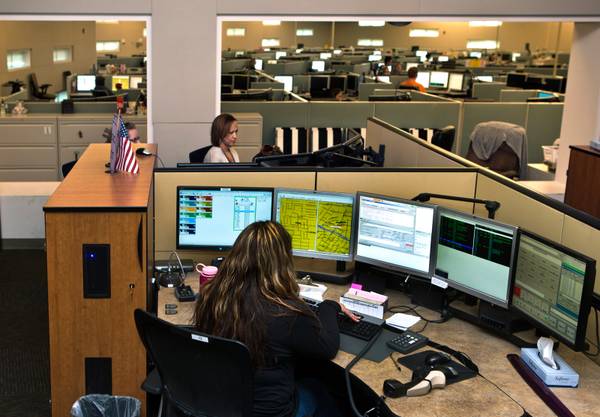The Las Vegas police department is scrambling to fill employee vacancies at its 911 center as wait times lengthen in recent months.
From April 2022 through February, Metro Police met its standard of answering 90% of its 1.1 million emergency calls within 10 seconds. But it missed the standard in December at 85% and in February at 76%.
The National Emergency Number Association, which sets national standards for 911 centers, asks that 90% of calls be answered within 15 seconds and 95% within 20 seconds.
“Seconds save lives,” said April Heinze, a director with the association. “The standards are set so that we can ensure that responders get to that person as fast as they can.”
Not all calls to Metro answered up to the industry standard of 15 seconds, let alone the department’s more stringent standard of 10 seconds, according to data provided to the Sun by Metro in a records request.
In data examined by the Sun, the average maximum wait time over the same period shot up to 2 minutes, 47 seconds. In December 2022, the average maximum wait time spiked at 3 minutes. The maximum wait got even longer in February, going to 4 minutes, 22 seconds.
The spike is directly attributed to staffing, officials said.
Metro has seen about 20 people recently leave the communications desk only to be replaced by an academy graduating class of nine people, said Deputy Chief Mike Gennaro, who oversees Metro’s recruitment and retention of employees. He said the 911 center vacancies are a “glaring issue” because “that’s the start of our customer service process.”
Metro has 69 vacancies among the 245 positions on its communications desk, a 28% shortfall. The desk includes 911 and nonemergency 311 call-takers and dispatchers.
“It is a high burnout rate,” Gennaro said. “We have all these people leaving. How do we get them to stay here?”
For comparison, the Metropolitan Police Department in Washington, D.C., which is comparable in size to the Las Vegas force, answered its calls slower with 85.9% of its emergency calls within 10 seconds last year.
Heinze said a number of police departments nationwide have struggled with staffing issues, especially since the coronavirus pandemic and in urban areas.
In Las Vegas, Metro is streamlining recruiting efforts and adjusting hiring standards to get more people into seats faster, while also making changes at the 911 center to retain staff, Gennaro said.
Gennaro, who started in January when Sheriff Kevin McMahill took office, said he first focused on improving the work environment, making some cosmetic changes and upgrading some of the computer equipment.
He said he also “started looking at the leadership and culture there.” Supervisors were enrolled in advanced leadership training classes, he said.
“We’ve got to fix overall morale,” he said.
Gennaro said every time he learns someone is leaving the center, he calls them. “I want to know why and if there is anything we can do to help,” he said.
Vacancies mean more workload is pushed onto those who remain, creating mandatory overtime and putting more of the staff at risk of burnout, Gennaro said.
Gennaro said Metro had added mental health resources, such as therapy dogs, to help with the situation.
Heinze said burnout was a real risk in the profession. “911 can be extremely stressful,” she said.
“A lot of 911 centers are bringing in more mental health initiatives, peer support, employee support programs,” Heinze said.
While figuring out how to retain call-takers and dispatchers, Gennaro is also focused on bringing more people into the academy.
Recently, Metro placed a large advertisement on the side of Allegiant Stadium announcing it is looking for officers and dispatchers.
Typing requirements to enter the academy were lowered from 45 to 35 words a minute to bring in more recruits, Gennaro said.
“This is huge,” Gennaro said. “Now we will have a bigger academy going in.”
The academy is going from single-digit class sizes to about 60 people in the next group that starts in May.
The process also was streamlined to get more people processed and approved before each academy, Gennaro said.
Previously applicants had to go through a background check and once completed had to complete a physical and then a psychological evaluation.
The academy is a 10-week program that teaches communications employees through classwork and demonstration. Following the academy, they work with a trainer on the communications floor for another 20 weeks before working independently. Those who move on to be dispatchers spend another 24 weeks training.
The National Emergency Number Association has been lobbying for 911 positions to be reclassified from clerical jobs to a protected services classification. If changed, it would increase pay for the positions by about 25%.
Metro Police pays call takers between $49,000 and $79,000 annually, and dispatchers between $57,000 and $85,000. Call takers answer on calls for both 911 and 311; dispatchers coordinate emergency response.
Gennaro also said he was continuing to look for solutions to help retain and recruit communications center employees. That includes researching technology that could speed up calls and reduce workloads.
It mostly comes down to getting people in the seats and making them feel valued, he said.
“You take for granted the job until you really think about it,” Gennaro said. “You don’t understand the stressors and everything that goes into it. You don’t understand the call the person had before yours. I never really realized the magnitude of it until I had been immersed in it. There are so many moving parts to that job and I have so much respect for it.”

